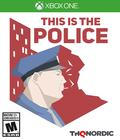Police officers and the corruption they face have been a popular topic for books, movies, and TV shows. Despite recent events, the job has always seemed stressful and dangerous, and there's great temptation to make some extra money on the side. This is the Police tries to deal with that element via a genre that exchanges bullets for management, and it works — to a point.
You play the role of Jack Boyd, the police chief of the city of Freeburg, who's led a pretty hard life thus far. One of his best friends on the force has been hit with a sex scandal, and his wife of many years has left him for someone much younger. The mayor is essentially his sworn enemy in a city riddled with crime. On top of that, he's just learned that he has six months left at his job before he's forcibly replaced. With everything going against him, he's decided to bank half a million dollars before his tenure is up. All he has to do is last that long.
What you'll immediately find is that the story is the strongest part of the game. By focusing on Jack, This is the Police gives him more dimension than normal video game protagonists. He constantly struggles to stay on the right side of the law, and when the breaking point comes when he must get into the pocket of a mobster to save his friend, it hurts. This is the kind of stuff you see in a drama, and you have a moment of doubt and feel like he's lost his way. This is by no means a feel-good tale, but those who are fine with that will get a well-told story.
The core revolves around managing your cops and detectives as they go about their daily lives. Your police force is split between the A and B shifts, so they work on alternating days. All of them have efficiency ratings and fatigue meters that let you know how likely they are to succeed at their jobs. At certain opportunities, you have the chance to upgrade a few officers via promotions, which can boost their efficiency beyond simply succeeding at tasks.
There are also vices, like alcoholism, that can determine if they'll even come to work. Speaking of which, the first thing you have to deal with each day are people asking for time off for various reasons. Some are legitimate, such as fatigue or dealing with funeral arrangements. Others are silly, like trying to finish up a book or going for a sale. While denying time off usually leads to more fatigue, approving too much of it can lead to being short-staffed on a particularly hellish day.
Once your roster is set, you're taken to a model of the city where you wait until a crime notification appears. You have a time limit that warns you how many seconds the alert will be there before the call disappears, and answering the call means assigning as many officers as you think are necessary for the incident. The incidents have a wide range and lack information beyond what's reported, so you'll have false reports like a wasp attacking a person, but you'll also get more serious incidents, like rape and robberies. The locations of these incidents determine how long the officers will be out, so some decision-making needs to occur in terms of sending out enough officers for the job while making sure you have enough to spare when more crimes pop up.
Throwing a wrench into all of this are special requests that crop up from time to time. Some will come from regular people, like directors looking for cops for a commercial or a TV show or shop owners needing some extra security. Those guarantee a payout, though you are at risk of losing an officer who didn't like the gig or finds that the pay is better than being on the beat. Then you have the requests from City Hall for PR events or to quell protests. Unlike other special requests, these have consequences if they're not fulfilled, since the mayor's office can deny your requests or give unfavorable reviews, which can slowly reduce your staffing.
It doesn't take long before the routine is broken by even more calamity. Whether you like it or not, you'll get involved with the local Mafia and start doing favors for them, like making sure no cops arrive for a mob-backed crime or send some of your officers to their aid when requested. Full-on mob wars between rival families will occur, and picking the wrong side means your eventual death. Later, you'll deal with a wave of cop killings that leaves your force scared, so everyone must partner up for safety. Other events will come through, like investigations by Internal Affairs, to stretch things even thinner; they could ruin you if you've been asking the mob to fence goods for you. You can use the mob to help you get out of a jam or use your deputy to tempt officers and officials to look the other way, but that also means losing money that could be used toward your goal.
On top of all of this are the long-term cases headed up by your detectives. Serving as a break from the everyday crimes you manage, these cases have you waiting until you collect enough pictures to identify the correct sequence of events. That sequence is determined by five eyewitness reports that come through, and you'll get lots of cash as a reward for solving them. While some cases are one-off events, others are part of a chain that eventually lead to the downfall of some gangs in the city. The one drawback is that your progress in getting the pictures depends on how many detectives you have on the case. Even then, expect it to be a slow process.
Despite everything going on to make things worse as days go by, the actual experience is rather calming. The days go by pretty quickly thanks to an accelerated game clock, and you are allowed some failures but still finish up the day relatively fine. At the same time, randomization can creep in unexpectedly. Try to break up a fight, and your officer may be dead. Other times, the criminal gets away or a civilian gets killed, robbing you of any XP for your officers. The randomization isn't amplified to the point where you'll fail everything with high-ranking officers, but you'll get odd results every now and then.
There's only a few things that derail This is the Police. The first has to do with the game's length. Though the days go by quickly, there are still 180 of them to get through. There are long stretches where no further story appears, and the lack of resolution to some of the crimes and the blank slate characters on your force means that those days will feel rather uneventful. Then again, it helps to think of this as a TV series rather than a movie, since various major story arcs are going on simultaneously. In that way, it feels less like grinding since you're binging on the game from that point.
The second has to do with some of the content. There's no specific timetable for when the game takes place, so you can't reason that some of the requests are authentic to the given time period, but it seems out of place when you're asked to fire all black cops to appease the racists and are calling LGB protesters "freaks." The same goes for a cop who calls a person a "Jap" in a self-defense class. It feels like this was done for shock value, and it cheapens the game.
You don't expect much graphically from a title that has you looking at a mostly static model of the city, but the style is aesthetically pleasing. The map provides a bunch of detail, from the droplets of rain during a storm to siren lights bouncing off buildings as cops roll by. The cut scenes take on the art style seen in early cinematic games, like Another World, where crude polygons and flat colors represent people without faces. That comparison is amplified greatly in the few scenes that feature motion instead of still picture frames, as the movement seems rotoscoped instead of computer-animated.
The sound absolutely shines, and the voice work evokes the emotions perfectly. This is especially true of Jon St. John, who embodies Jack and shows that the character could rarely enjoy a brief moment of happiness. Meanwhile, the various classical and jazz tunes during each day generate the perfect mix of film noir with hints of sadness and joy in each track. You're only given a meager selection of songs from the outset, and you'll have to spend money to expand your library.
If you don't mind a drip feed of soul-crushing events, then This is the Police will work for you. The actual gameplay is littered with questionable content, but the core is engaging for both quick and marathon sessions. The story is what holds things together; the many twists are fascinating, and the presentation is charming due to its artistic simplicity. It may not be for everyone, but for those looking for something a little different, This is the Police is worth a shot.
Score: 7.0/10
More articles about This Is the Police











 This Is the Police is a strategy/adventure game about power and corruption, duty and choice, featuring a rich story narrated by Duke Nukem's Jon St. John.
This Is the Police is a strategy/adventure game about power and corruption, duty and choice, featuring a rich story narrated by Duke Nukem's Jon St. John.







































